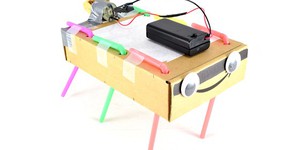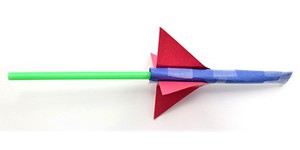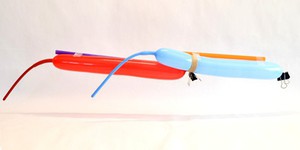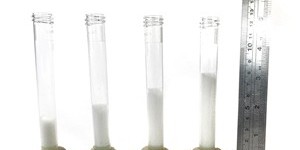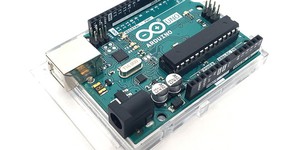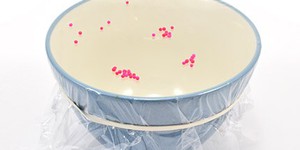Lesson Plans (247 results)
|
Select a resource
Sort by
|
Lesson Plan
Grade: 6th-8th
2 reviews
Teach your students about the engineering design process with this fun lesson plan. They will design and build the tallest possible tower using nothing but paper and tape, but there's an additional twist on this classic activity. The tower must support a heavy weight at the top without collapsing! Teachers, note that elementary and high school versions of this lesson plan are also available.
The 2021 Engineering Challenge is over, but you can still try out this fun challenge with your…
Read more
NGSS Performance Expectations:
Featured
Lesson Plan
Grade: 6th-8th
7 reviews
Junkbots are easy-to-build robots that you can make using a simple circuit and some recyclable materials. In this lesson, your students will learn about engineering design as they compete to build the fastest robot. No previous robotics experience is required!
Read more
NGSS Performance Expectations:
Lesson Plan
Grade: 3rd-5th
17 reviews
This lesson will introduce your students to the scientific method using a fun, hands-on activity.
A middle school version of this lesson plan is also available.
Read more
NGSS Performance Expectations:
Lesson Plan
Grade: 6th-8th
5 reviews
Learn about real space flight and Newton's laws of motion with this fun lesson! This new twist on a classic project lets your students build a multi-stage balloon rocket that they can launch across the classroom.
Read more
NGSS Performance Expectations:
Video Lesson
Grade: 6th-8th
8 reviews
Chemical reactions can result in interesting products! In this lesson, students learn how plastics are made by conducting a polymerization reaction in a simple milk-to-plastic transforming experiment. During their experiments, students will be able to compare the physical properties of their reactants (milk and vinegar) and their resulting organic casein polymer.
Read more
NGSS Performance Expectations:
Lesson Plan
Grade: 9th-12th
1 review
In this lesson, students will employ the enzymatic decomposition reaction of hydrogen peroxide to investigate how chemical reactions are affected by enzymes and different substrate concentrations. Students will be challenged to control the rate of the reaction by adjusting the amount of substrate and thus changing the catalase activity. Foam production, created by the enzymatic breakdown of hydrogen peroxide into water and oxygen, will function as a proxy for the reaction rate. Based on their…
Read more
NGSS Performance Expectations:
Lesson Plan
Grade: 3rd-5th
1 review
Do your students have their own online accounts like email or social media? What about a login for the school computers? If so, they might have to pick passwords. Have you ever had trouble creating (and forgetting) good passwords? This fun lesson plan involves a guessing game that can teach your students how to make their passwords harder to guess. Learn how to keep your accounts safe!
Read more
Lesson Plan
Grade: 3rd
1 review
Everybody and everything that is opaque has a shadow. Shadows are fun to play with because you can change their shape and size or even make them disappear. In this lesson, students will first explore how shadows are made and how their appearance can be changed. Then students will use their gained knowledge to create and perform a shadow play.
Remote learning: Part 1 on this lesson plan can be conducted remotely. The Engage section of the lesson can be done over a video call, then students can…
Read more
NGSS Performance Expectations:
Lesson Plan
Grade: 6th-12th
Create a two-part system for filtering greywater. Teams will focus on communication and systems engineering as they build separate components to filter solid and liquid waste and then combine them into one device.
Learning Objectives
Students will:
Consider the potential effects of drought and how greywater could be part of the solution.
Design a system for filtering out solid waste or liquid waste.
Consider effective communication strategies with their team.
Collaborate on their design…
Read more
Lesson Plan
Grade: 6th-12th
7 reviews
This lesson plan will introduce your students to physical computing: the process of building circuits and programming a microcontroller (an Arduino UNO®) to interact with them. The lesson is broken into seven activities that will walk your students through the basics of setting up the Arduino and interacting with circuit parts like LEDs, buttons, and resistors. This introductory material will help prepare your students for more advanced Arduino projects.
Read more
Lesson Plan
Grade: 1st
4 reviews
Can you make something move by using only sound? Your students will find out in this lesson plan as they explore the connection between sound and vibrations.
This is the second in a pair of lessons about sound. See Sound and Vibrations 1: Rubber Band Guitar for the first lesson.
Read more
NGSS Performance Expectations:
|
Explore Our Science Videos
DIY Mini Drone Part 3: Arduino Altitude Control
Splitting Water
How to Make an Archimedes Screw - STEM Activity



